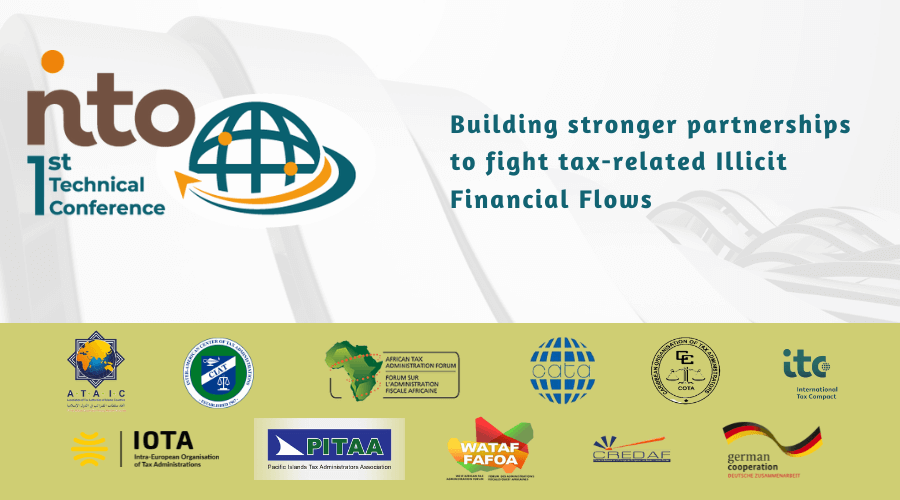NTO 1st Technical Conference – Fight against tax crimes: international conference gathers experts, practitioners, and decision-makers for an intensive three-day exchange

Building stronger partnerships to fight tax-related illicit financial flows – under this theme the Network of Tax Organisations (NTO) hosted its 1st Technical Conference from 19 to 21 of October. The virtual event brought together experts, practitioners, and decision-makers from around the world. 55 speakers and more than 500 participants from over 100 countries analysed current best practices on the global, regional and national level and identified opportunities for cooperation between tax administrations and various other stakeholders.
Financial crimes, including tax crimes, money laundering, and terrorism financing, undermine political and economic interests of all countries, whether small or large, developed or developing. However, for developing countries, financial crimes are a particularly serious threat, as they strip them of scarce resources available for sustainable development. According to the United Nations Conference on Trade and Development (UNCTAD) ‘Trade and Development Report 2020’ revenue losses caused by tax-related illicit financial flows (IFFs) are between $49 and $193 billion annually.
The conference provided a platform for broad discussions on the latest international developments in tackling tax crime, the changing nature of tax-related illicit financial flows, practical challenges, and ways forward. The focus was on revenue administrations and their needs. An interactive, fully virtual environment allowed for an in-depth exchange of experiences and best practices. The perspectives of various stakeholders added value to the conference.
At the opening of the conference, the moderator Melinda Crane, and the head of the NTO Council Márcio Ferreira Verdi, Executive Secretary of the Inter-American Center of Tax Administrations (CIAT), welcomed participants from over 100 countries. Dr. Maria Flachsbarth, the Parliamentary State Secretary to the German Federal Minister for Economic Cooperation and Development, underlined in her opening remarks the importance of domestic revenue mobilisation for sustainable development and a need for consolidated global effort to combat illicit financial flows. She highlighted the role of NTO in this process and reiterated the support of Germany to the NTO’s work.
Ruud de Mooij, advisor to the Immediate Office of the Fiscal Affairs Department at the International Monetary Fund, also emphasized the threat posed by illicit financial flows, especially to developing countries. He distinguished legal tax avoidance from illegal tax evasion. Different measures are needed to combat these two types of illicit financial flows, Ruud de Mooij explained.
The situation in African countries was the focus of Carlos Lopes’ welcoming remarks. The professor at the Mandela School of Public Governance, University of Capetown, took a critical look at the progress made so far in combating illicit financial flows. He called out on rent-seeking behaviour at the basis of the political models, as the persistent problem, hindering the fight against IFFs and voiced the need for a fundamental debate on the structures of African economies.
Irene Ovonji-Odida, advocate and member of the UN FACTI High Level Panel and the AU/ECA High Level Panel on Illicit Financial Flows from Africa, highlighted the importance of the conference, given the critical role of the fight against tax-related IFFs for domestic revenue generation.
Focusing on current international developments and existing challenges, the opening panel gave an overview of the tax administrations’ approaches and needs in their fight against illicit financial flows. ‘My main take away from this panel is that illicit financial flows are a global challenge that needs to be addressed with both internal and international actions,’ one of the attendees shared after the event. In break-out sessions, participants addressed on the first conference day the role of beneficial ownership in combating tax crimes as well as effective responses from tax administrations to financing of terrorism, money laundering and tax evasion.
The second conference day was dedicated to the inter-institutional cooperation and digital tools in the fight against IFFs. In the plenary speakers of national revenue authorities and networks from Asia and Africa as well as a representative of ‘Tax Inspectors Without Borders’ provided insights into how successful tax administrations have been in making use of increased transparency and global data availability. In workshops participants held in-depth discussions about concrete examples of inter-agency cooperation, mutual assistance, enforcing tax compliance in the digital space and using digital tools for tackling tax crime.
‘Lessons learnt and way forward’ was the theme on the third conference day. Participants identified critical areas in the current methods of combating economic and financial crimes and focused on international development efforts in ensuring developing countries’ access to global tax initiatives. The conference concluded with a panel discussing the role of the NTO and tax organisations in the fight against tax-related illicit financial flows and in strengthening international cooperation.
By advocating and promoting international, South-South, and inter-institutional cooperation between revenue administrations, law enforcement authorities and other governmental institutions, the conference served as a starting point for continued discussions on strategies to widen collaboration in tackling financial crime. A summary document containing key take-aways and core content from the panels will be available on the NTO website soon.
About the Network of Tax Organisations (NTO)
Founded in May 2018 in Ottawa (Canada), the NTO brings together nine member organisations that represent over 180 countries worldwide. In order to foster capacity development and internal collaboration among its members, the NTO offers peer-learning activities and opportunities to exchange information and experiences. The NTO Secretariat is facilitated by the International Tax Compact (ITC) and financed by the German Federal Ministry for Economic Cooperation and Development.
Source: Network of Tax Organisations (NTO)
2,054 total views, 3 views today
